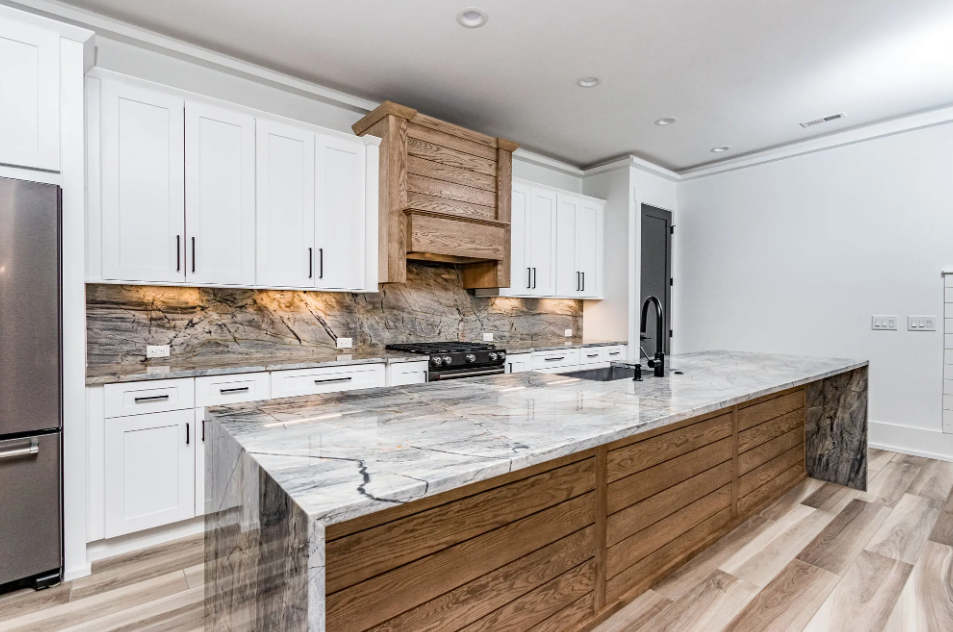Quartzite Unveiled: A Guide to a Naturally Stunning Stone
Among the various countertops, quartzite is popular among homeowners who want to add natural elegance and durability to their kitchen or bathroom. But before you jump into investing in this material, it's important to know some essential facts about quartzite countertops.
We will walk you through the differences between quartz and quartzite, the benefits of using quartzite in your home, the possibility of etching or scratching, the need for sealing, cleaning tips and more. By the end of this post, you'll learn to decide whether quartzite countertops are suitable for your home. Let’s go!
Disclosing the Essential Facts about Quartzite Countertops
Should You Consider Quartzite a Natural Stone?
Quartzite is a natural stone formed from sandstone and quartz under intense heat and pressure. It's a metamorphic rock that's been helpful for centuries in construction and it's becoming increasingly popular for use in home decor.
One of the main advantages of quartzite is its durability - it's one of the hardest natural stones available, and it can withstand high temperatures and heavy use.
Noting the Differences between Quartz and Quartzite
While quartzite is a natural stone, quartz undergoes engineering from ground-up quartz and resin. Quartz is famous for countertops because it's non-porous, easy to clean, and has various colors and patterns.
Note that quartzite countertops have a unique beauty that comes from their natural variation in styles and colors. They are more robust and heat-resistant than quartz.
Quartzite is an excellent choice if you're looking for a natural stone that will add timeless elegance to your home.
Beneficial Uses of Quartzite
In addition to being used for countertops, quartzite has a variety of other beneficial uses in construction and home decor.
One can use it for flooring, backsplashes, fireplace surrounds, and outdoor features like patio tiles and pool decks.
Because of weather resistance and durability, quartzite is an excellent choice for outdoor spaces that remain exposed to the elements.
Etching or Scratching Possibility
One of the main concerns homeowners have about countertops comprising quartzite is the possibility of etching or scratching.
Etching occurs when acidic substances like lemon juice or vinegar meet the surface of the stone, and it can leave a dull, whitish mark.
Scratching can occur if the surface faces exposure to sharp objects like knives or abrasive cleaning tools.
One can minimize these issues by choosing a quartzite with a honed or leathered finish instead of a polished finish and avoiding acidic cleaners and abrasive tools.
Is There Any Need for Sealing?
Quartzite is a porous material, which means it can absorb liquids and stains if one overlooks its proper sealing. However, some quartzite countertop types are more porous than others, so it's essential to consult your supplier or installer to determine the best sealer for your specific countertop.
Generally, quartzite should be sealed at least once a year to protect it from stains and liquids.
Cleaning Tips to Follow
Following a few cleaning tips is essential to keep your countertops looking their best.
First, avoid using abrasive cleaners or tools that can scratch the stone's surface. Instead, use a soft cloth or sponge and a gentle, non-acidic cleaner.
If you spill something on the surface, clean it up immediately to prevent staining.
Finally, avoid exposing the surface to extreme temperatures or sudden changes in temperature, which can cause cracking or other damage.
Staining Possibility
While quartzite is more resistant to staining than some other types of natural stone, it's still possible for liquids like red wine or coffee to leave a permanent mark if one refrains from cleaning it quickly.
It's essential to wipe up spills as soon as possible to prevent staining and to use coasters or trivets to protect the surface from heat and moisture.
If you notice a stain on your countertop, you can use a poultice made from baking soda and water to draw out that stain. However, it's always best to consult a professional if you're unsure how to treat these heavy-duty stains or need help with deep cleaning or maintenance.
Recognizing True Quartzite
Finally, it's important to note that not all "quartzite" on the market is authentic. Some stones that various companies market as quartzite may be marble or other natural stone more susceptible to etching and staining.
Working with a reputable supplier or installer is essential to ensure you're getting true quartzite. These professionals can provide documentation of the stone's composition and properties.
Hom Kitchen & Bath - Your Source for Quality Countertops
If you're considering quartzite countertops for your home, hold the helping hands of Hom Kitchen & Bath. We aim to provide a wide selection of natural stone and engineered stone countertops, including quartzite in various colors and patterns.
Our team of experts can help you choose the perfect countertop for your space, and we'll work with you to ensure that it's properly installed and sealed. With Hom Kitchen & Bath, you can trust that you will get quality countertops and exceptional customer service. Contact us today to learn more about our products and services.

